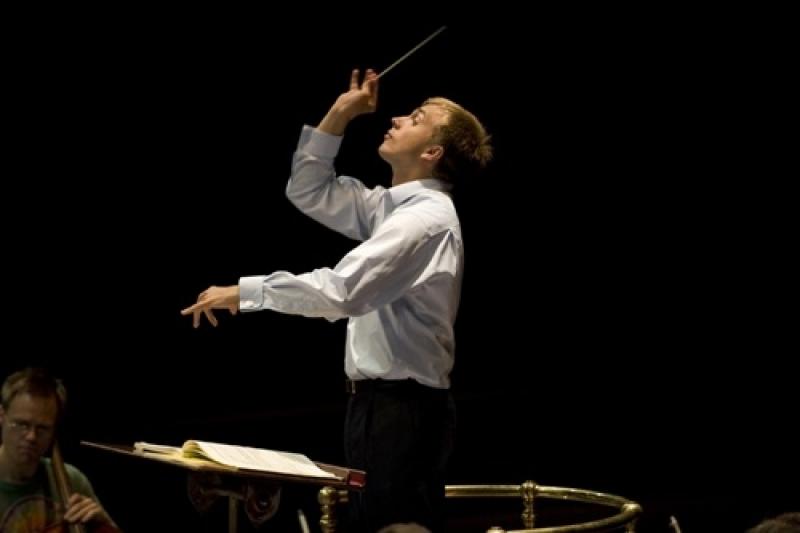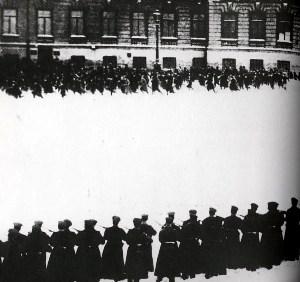London Philharmonic Orchestra, Vasily Petrenko, Royal Festival Hall | reviews, news & interviews
London Philharmonic Orchestra, Vasily Petrenko, Royal Festival Hall
London Philharmonic Orchestra, Vasily Petrenko, Royal Festival Hall
The phenomenal Russian conductor goes the extra mile in Shostakovich

That in itself was enough to tell us that Petrenko isn’t just a supremely elegant conductor, an easy stylist able to make Stravinsky’s fiddly early Scherzo fantastique sound natural and to paper over the cracks of a tottering soloist, Oleg Marshev, in Prokofiev’s Third Piano Concerto, but alre
For the first three movements of Shostakovich’s hour-long narrative, I went along with all the sonic marvels but I can’t say I felt it in every bone of my body. This is master storytelling on the composer's part, but is he doing any more in terms of space and drama than Vyacheslav Vyskosky in his 1925 film The Ninth of January (pictured below)? The astonishing thing about young Petrenko's Shostakovich symphonies on disc so far, especially his recent, radically rethought account of the Tenth, is the line he conducts through long-term arguments, reclaiming these works from mere chronicles of Soviet history to towering symphonies in their own right. That isn't so easy to do with the brooding atmosphere Shostakovich conjures in the first movement of the Eleventh, more of a prelude with songs and snatches. But what songs: it was Anna Akhmatova who heard in the two flutes intoning "Listen!", a sombre prison ballad, "white birds flying against a terrible black sky". Poignant work here from the LPO woodwind, complemented by the ominous trumpet calls and a silky depth in the cellos' phrasing which I haven't heard in such a work since Rostropovich's last, shattering LSO performance of the Eighth Symphony.
 The people stir against the Tsar's troops in the second movement, starting last night with no noticeable gear change but a quite amazing susurration from within, like the inchoate cries of the rebellious sailors in Britten's Billy Budd (premiered, incidentally, in 1951, only six years before the symphony). Some performances make this sequence feel like one uprising too many, but Petrenko kept the struggle razor-sharp through to the overwhelming blitz of the massacre, percussion tattoo never overwhelming the thematic transformations which are still going on above it. He treated the lament of the slow movement - the very moving "Eternal Memory", which an old student of mine once sang to me, recalling it from her youthful days in "our red Vienna" - as the simple song it is, violas rejecting sophistication until their string brothers joined them.
The people stir against the Tsar's troops in the second movement, starting last night with no noticeable gear change but a quite amazing susurration from within, like the inchoate cries of the rebellious sailors in Britten's Billy Budd (premiered, incidentally, in 1951, only six years before the symphony). Some performances make this sequence feel like one uprising too many, but Petrenko kept the struggle razor-sharp through to the overwhelming blitz of the massacre, percussion tattoo never overwhelming the thematic transformations which are still going on above it. He treated the lament of the slow movement - the very moving "Eternal Memory", which an old student of mine once sang to me, recalling it from her youthful days in "our red Vienna" - as the simple song it is, violas rejecting sophistication until their string brothers joined them.
But it was the finale which stunned me: Petrenko brought electrifying incisiveness to the treatment of the famous revolutionary song "Varshavianka" and convinced us that the struggle might almost, jubilantly, be won before its horrifying implosion. This time the return of the frozen Palace Square hymns and shudders, capped by Sue Bohlin's supremely eloquent cor anglais solo - every player of this instrument in London seems to be getting plaudits these days - brought tears to the eyes. And the final drive against the inexorable Musorgskyan tocsin, even if the bell could have been more apocalyptic, was simply hair-raising. No wonder Petrenko had metamorphosed from the well-groomed, smiling young man into a deathly pale wreck at the end: I'd hazard a guess that this finale took him and the orchestra to places they hadn't anticipated.
So it was probably just as well that the first half was well ordered and vivacious, at least from the orchestral point of view. Stravinsky's early, pre-Firebird Scherzo fantastique - completed, in fact, only a couple of years after those momentous 1905 events in his home city of Petersburg - mixes Debussy with Wagner and adds fiendish touches for zinging harps and flutter-tonguing flutes and trumpets. This effervescent homage to Maeterlinck's Life of Bees sounded more delicately humoristique than luridly fantastique last night, and all the better for it.
As was the LPO's contribution to Prokofiev's Third Piano Concerto, superbly well sprung in its wonky gavottes and toccata-like charges. I've enjoyed Oleg Marshev's concerto recordings, but this was not a good night for him. Though he played the few quiet passages with a spellbinding sense of mystery, it would have taken the tonal sparkle of Kissin or Simon Trpceski to match what Petrenko's players were up to. In the finale, Marshev's slip could have sent the orchestra off the rails, had Petrenko not been super-alert, and most of the audience wouldn't have known that, having lost the plot, the pianist simply made the last minute up.
Scary stuff. Which didn't stop him coming on for a crash-bang Liszt encore. Exactly the sort of playing which reminded you why Khatia Buniatishvili's B minor Sonata the other week was truly special, though many folks hated it. With such brilliant expressiveness on the increase among the younger generation, not-so-rock-solid virtuosos like Marshev are going to have to look to their laurels. But last night belonged to Petrenko, and a standing ovation for the Shostakovich was absolutely in order.
- Find Vasily Petrenko's Shostakovich and Tchaikovsky recordings with the Royal Liverpool Philharmonic Orchestra on Amazon
- Listen to an LPO podcast of Petrenko in conversation with David Nice before the concert
- Further details of the LPO's 2010-11 season on the orchestra's website
- See what's on at the Southbank Centre this season
- Read Petrenko's blog on the RLPO website
Watch Vasily Petrenko conduct the Royal Liverpool Philharmonic Orchestra in the wacky finale of Shostakovich's Sixth Symphony:
Share this article
Add comment
The future of Arts Journalism
You can stop theartsdesk.com closing!
We urgently need financing to survive. Our fundraising drive has thus far raised £49,000 but we need to reach £100,000 or we will be forced to close. Please contribute here: https://gofund.me/c3f6033d
And if you can forward this information to anyone who might assist, we’d be grateful.

Subscribe to theartsdesk.com
Thank you for continuing to read our work on theartsdesk.com. For unlimited access to every article in its entirety, including our archive of more than 15,000 pieces, we're asking for £5 per month or £40 per year. We feel it's a very good deal, and hope you do too.
To take a subscription now simply click here.
And if you're looking for that extra gift for a friend or family member, why not treat them to a theartsdesk.com gift subscription?
more Classical music
 Solomon, OAE, Butt, QEH review - daft Biblical whitewashing with great choruses
Even a top soprano and mezzo can’t make this Handel paean wholly convincing
Solomon, OAE, Butt, QEH review - daft Biblical whitewashing with great choruses
Even a top soprano and mezzo can’t make this Handel paean wholly convincing
 Two-Piano Gala, Kings Place review - shining constellations
London Piano Festival curators and illustrious friends entertain and enlighten
Two-Piano Gala, Kings Place review - shining constellations
London Piano Festival curators and illustrious friends entertain and enlighten
 Echo Vocal Ensemble, Latto, Union Chapel review - eclectic choral programme garlanded with dance
Beautiful singing at the heart of an imaginative and stylistically varied concert
Echo Vocal Ensemble, Latto, Union Chapel review - eclectic choral programme garlanded with dance
Beautiful singing at the heart of an imaginative and stylistically varied concert
 Scott, Irish Baroque Orchestra, Whelan, RIAM, Dublin review - towards a Mozart masterpiece
Characteristic joy and enlightenment from this team, but a valveless horn brings problems
Scott, Irish Baroque Orchestra, Whelan, RIAM, Dublin review - towards a Mozart masterpiece
Characteristic joy and enlightenment from this team, but a valveless horn brings problems
 Classical CDs: Voice flutes, flugelhorns and froth
Baroque sonatas, English orchestral music and an emotionally-charged vocal recital
Classical CDs: Voice flutes, flugelhorns and froth
Baroque sonatas, English orchestral music and an emotionally-charged vocal recital
 Kanneh-Mason, Britten Sinfonia, Shave, Milton Court - a grin and a big beaming smile
A pair of striking contemporary pieces alongside two old favourites
Kanneh-Mason, Britten Sinfonia, Shave, Milton Court - a grin and a big beaming smile
A pair of striking contemporary pieces alongside two old favourites
 theartsdesk at the New Ross Piano Festival - Finghin Collins’ musical rainbow
From revelatory Bach played with astounding maturity by a 22 year old to four-hand jazz
theartsdesk at the New Ross Piano Festival - Finghin Collins’ musical rainbow
From revelatory Bach played with astounding maturity by a 22 year old to four-hand jazz
 First Person: Manchester Camerata's Head of Artistic Planning Clara Marshall Cawley on questioning the status quo
Five days of free events with all sorts of audiences around Manchester starts tomorrow
First Person: Manchester Camerata's Head of Artistic Planning Clara Marshall Cawley on questioning the status quo
Five days of free events with all sorts of audiences around Manchester starts tomorrow
 Goldscheider, Brother Tree Sound, Kings Place review - music of hope from a young composer
Unusual combination of horn, strings and electronics makes for some intriguing listening
Goldscheider, Brother Tree Sound, Kings Place review - music of hope from a young composer
Unusual combination of horn, strings and electronics makes for some intriguing listening
 theartsdesk Q&A: composer Donghoon Shin on his new concerto for pianist Seong-Jin Cho
Classical music makes its debut at London's K-Music Festival
theartsdesk Q&A: composer Donghoon Shin on his new concerto for pianist Seong-Jin Cho
Classical music makes its debut at London's K-Music Festival

Comments
...
...
...
...
...